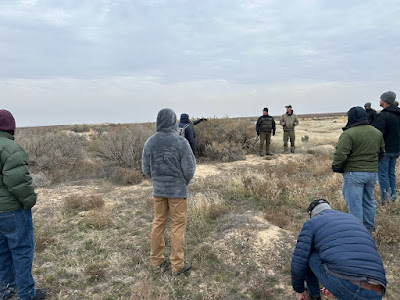On November 30, 2023, members of the BLM Fire Operations Group (FOG) and Engine Subcommittee visited the site of the 1995 Point Fire to honor fallen Kuna volunteer firefighters Bill Buttram and Josh Oliver.

Site Visit Takeaways and Discussion
- Boise District worked with local cooperators to develop a local cooperator assistance program.
- Boise District utilized sand table exercises to build relationships and create common operating pictures/terminology between the BLM and local cooperators.
- Communications were an issue; issues still exist.
- The effort to get a common bank of frequencies took years
- "Communication is key; we have to own it." - Gary Bishop, Utah State Assistant Fire Management Officer
- Training
- Do right by your cooperators. Ensure they get trained and have the tools to do the job.
- "Train our new firefighters and tell them these stories." - Aaron Thompson, Montana State Fire Management Officer
- Transitions are tough. Establish unified command.
- Provide clear leader's intent.
- Ensure all resources know the "why" and have a common operating picture.
- Having a bias for action is acceptable; going rogue is not acceptable.
- Human Factors
- Your sense of direction is easily lost when landmarks are unavailable.
- Weather
- Some firefighters in their vehicles were unaware of subtle changes in the weather.
- The red flag was announced over the radio on BLM channel.
- Don't ignore warnings.
- Be aware of changes.
- Terrain
- Brush was 5’ tall and plentiful.
- Experience
- Experience on BLM engines was 15+ years.
- Kuna engine personnel lacked experience.
- Briefings
- Take time to tie in with resources and talk to firefighters you don't know and connect with those you do.
- Briefings during initial attack are vital. Practice the information you need to brief and how you get the information across in a short period of time. It's chaotic!
- Set up a staging area with a staging manager to track and brief personnel.
- Team Cohesion
- No mutual aid agreement with Kuna, no prior face-to-face communication.
- Preparedness
- Be prepared to respond to accidents and fatalities; ensure you practice and take care of your people.
- Include managers and cooperators in developing serious incident and loss of duty death planning.
Questions to Consider
- Could they actually see the road?
- Where is your SA? On the equipment, fire?
- How reluctant would you be to leave your equipment if you had to?
- How much water do you keep in your engine, or do you run it out?
- How would you in a leadership position deal with firefighters who are first on scene of a fatality and what they are going through?
- If you hear bad news on a fire where you have employees/co-workers assigned, how and when are you checking on your employees?
- If you are on the fire do you take time to check in with your loved ones or keep fighting fire?
- Do you communicate what a Red Flag Warning means to the fire your are supporting?
 |
| Point Fire fatality site |
We honor through learning and sharing the information from our tragedies. Never forget!
Point Fire Resources
For more information and to walk through the stands with those who were there, visit the following:
- Point Fire (ArcGIS)
- Remembering the Point Fire 20 Years Later
- Point Fire (Idaho) - Six Minutes for Safety


No comments:
Post a Comment
********
The WFLDP seeks to build and support an online community in which wildland fire professionals can interact.
We invite respectful discussion; however, the realities of online culture is such that anonymous posts and posts from children under the age of 13 are not accepted.
All comments are monitored by our editorial staff for appropriateness in meeting the mission of the WFLDP prior to posting to the blog. We do not discriminate against any views, but we reserve the right not to post comments.
Individuals posting comments are fully responsible for everything that they submit.
Comments submitted after hours and on holidays/weekends will be reviewed as early as possible the next business day.
Our complete blog policy can be found at http://www.fireleadership.gov/committee/reports/Blog_Policy_Jan2010.pdf.
A yellow box will appear after you submit your comment notifying you that your comment will be reviewed.